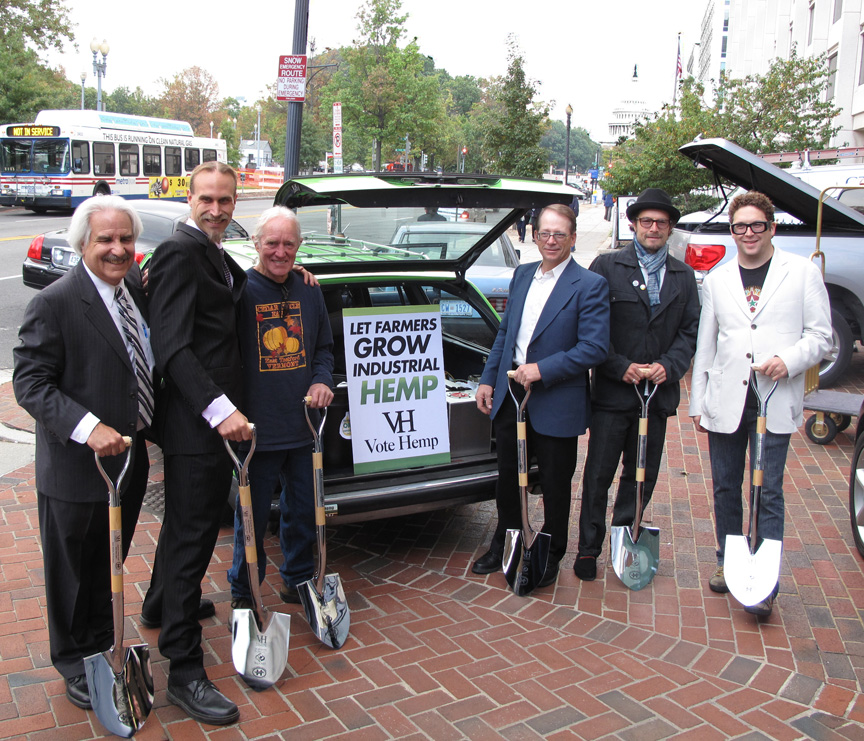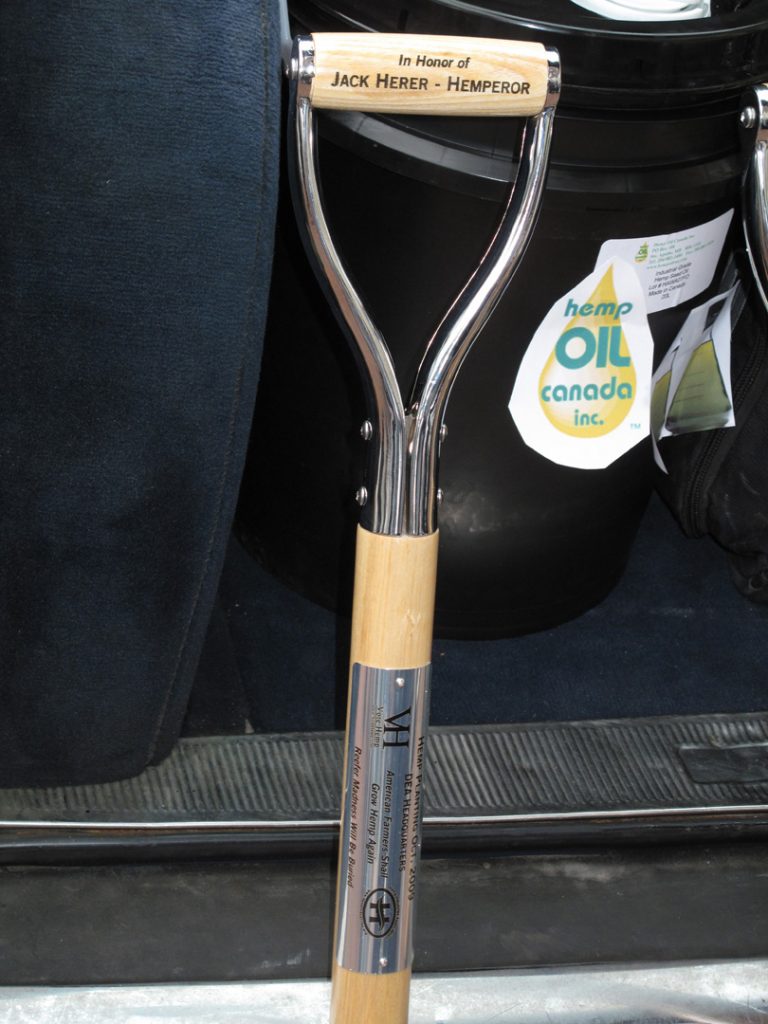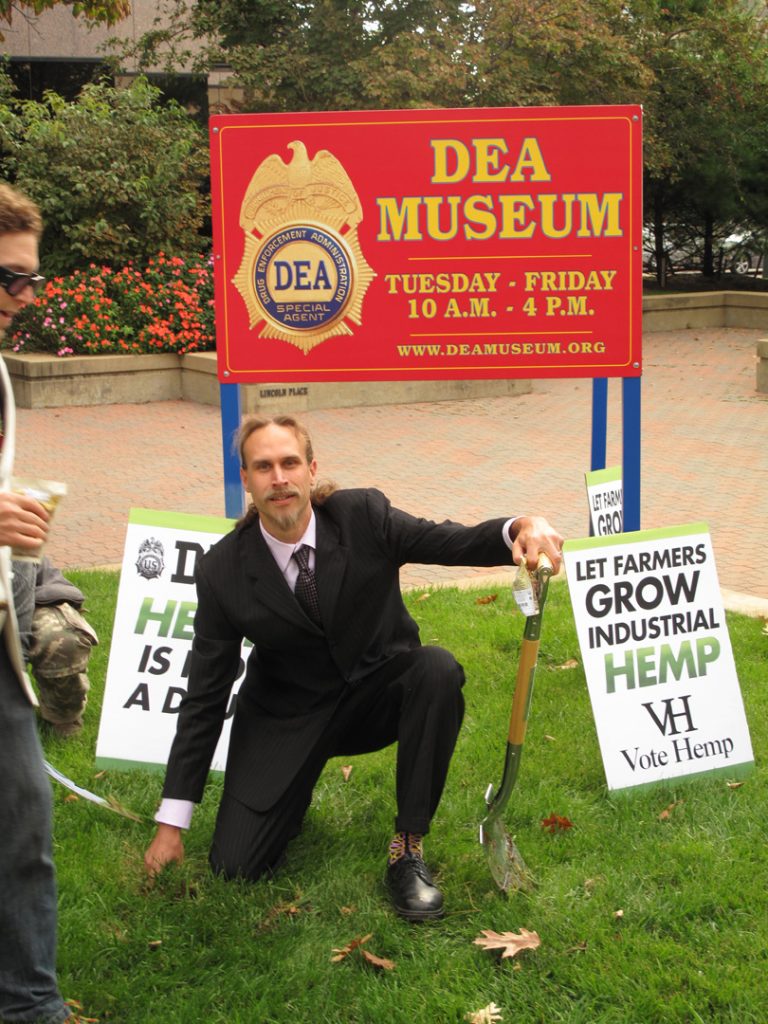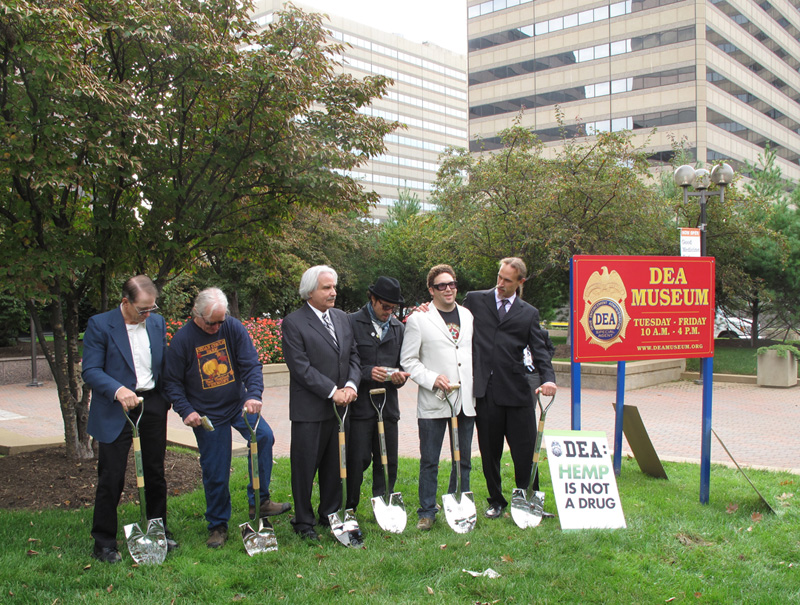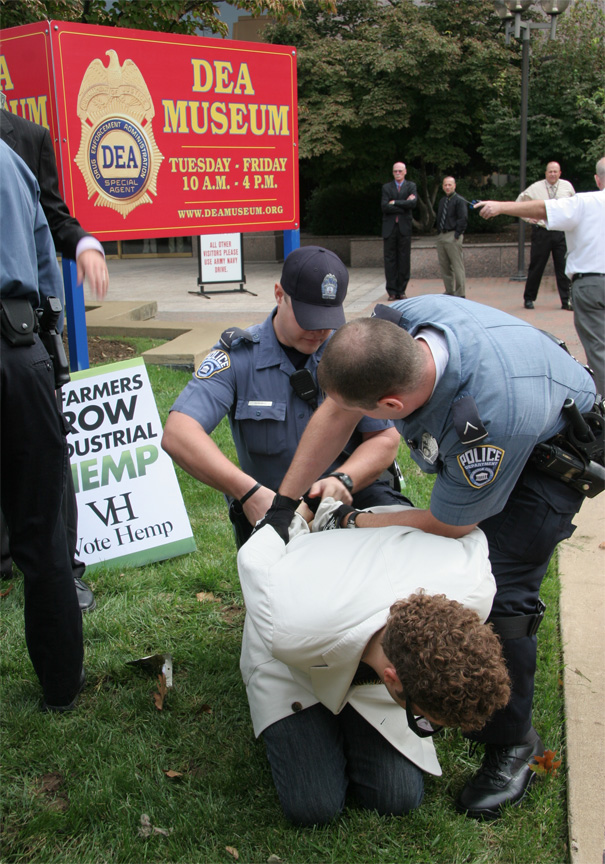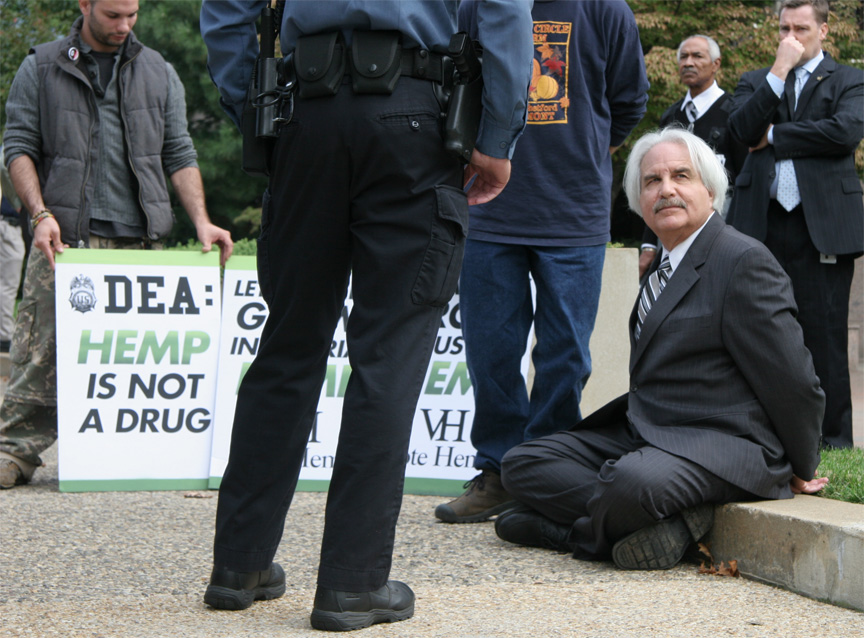WASHINGTON, DC — Today marks the start of the 1st Annual Hemp History Week, which is taking place between now and May 23, 2010. As a national grassroots education campaign, 185 events have been planned nationwide in 32 states with the goal of renewing strong support for hemp farming in the U.S. In addition to events across the country, organizers also plan to collect tens of thousands of hand-signed postcards addressed to President Barack Obama and Attorney General Eric Holder asking them to end the ban on hemp farming and let farmers once again grow the versatile and profitable crop.
Hemp History Week volunteers across the country have researched the history of hemp farming and manufacturing in their regions before the crop was essentially banned by its misclassification as a drug. Among this re-discovered history are the diaries of USDA Chief Botanist Lyster Dewey who bred hemp cultivars extensively in the Washington, DC area during the early part of the 20th Century, primarily at Arlington Farms on which the Pentagon was built. The diaries and personal photos of the USDA’s top expert on fiber production for more than 45 years reveal a treasure trove of information on hemp farming research by the U.S. Government from the 1890’s to the 1940’s. This and other research will be presented at scheduled public events this week, along with presentations by local politicians such as David Norris, Mayor of Charlottesville, VA; prominent business leaders such as David Bronner, President of Dr. Bronner’s Magic Soaps; and others who support hemp farming in the United States. Events are planned in Alaska, Arizona, California, Colorado, New Mexico, North Carolina, Vermont, Virginia, Oregon, South Dakota, Texas and Washington, D.C. among other states. A complete listing of Hemp History Week events is available at: http://www.hemphistoryweek.com
Hemp History Week supporters include Congressman Ron Paul of Texas, who submitted an official statement in support of Hemp History Week to Congress earlier this month. “Hemp was an important crop for George Washington, Thomas Jefferson and thousands of American farmers until it was outlawed completely in 1970 by the Controlled Substances Act. I know many farmers in my district could benefit greatly from the renewed freedom to rotate industrial hemp into their growing seasons. Hemp History Week will help other elected officials learn about America’s rich hemp heritage along with the tremendous benefits of growing hemp in America once again,” explains Rep. Ron Paul, R-Texas.
In addition to volunteer-run events nationwide, natural product retail outlets are also participating in Hemp History Week by sampling best-selling hemp products in their stores, including: Nature’s Path’s Hemp Plus™ Granola Cereal, Sunny Hemp™ Granola Bars and Hemp Plus™ Waffles; Living Harvest Foods Tempt™ hemp milk and frozen desserts; Nutiva’s organic shelled hemp seed; Manitoba Harvest Hemp Pro™ 70 and Hemp Pro™ 50 protein powders and Dr. Bronner’s Magic Soaps. Participating stores include Mom’s Organic Market in the Washington, D.C. region as well as Westerly Natural Market in New York City, Earthfare in North Carolina, Henry’s Farmers Markets, Rainbow Grocery and Jimbos Naturally in California, New Seasons Market in Portland, Oregon, in addition to local co-ops throughout the country.
“Lost opportunities for farmers and businesses have real consequences,” says David Bronner, President of Dr. Bronner’s Magic Soaps, which uses imported hemp oil in almost all of their products. “With over $396 million in estimated U.S. retail sales, American companies making hemp products have no choice but to import their raw materials because our farmers continue to fear they will be prosecuted for growing hemp, due to an out of date federal ‘Reefer Madness’ policy which confuses non-drug industrial hemp with drug varieties of Cannabis,” adds Bronner.
Sustainable hemp seed, fiber and oil are already used in nutritious food, textiles, body care and even auto-parts. Companies like Ford Motors, Patagonia, and The Body Shop, in addition to Hemp Industries Association members are using imported hemp in their products today.
“Supporting the hemp industry is something that is very close to our hearts at Nature’s Path,” said Arjan Stephens, Vice President of Marketing and Product Innovation for Nature’s Path Organic Foods. “My father and founder of Nature’s Path, Arran Stephens, successfully fought in the three-year battle with the United States DEA to overturn its ban on the sale of healthy hemp foods and I’m proud to follow in his footsteps by supporting Hemp History Week.”
For the last four growing seasons, farmers in North Dakota have received licenses from the North Dakota Department of Agriculture to grow industrial hemp. Despite the state’s authorization to grow hemp, these farmers risk raids by federal agents and forfeiture of their farms if they try to grow the crop, due to the failure of the Drug Enforcement Administration to distinguish non-drug industrial hemp from drug types of Cannabis.
“Despite the ban, consumers still want nutritious hemp foods—and we do not want to deny the goodness of hemp to anyone”, explains Hans Fastre, CEO of Living Harvest Foods, the global leader in hemp food products, including Tempt™ hemp milk, frozen dessert and protein powder. “By allowing U.S. farmers to sell hemp seed, we’ll be better able to manage costs, including the cost of product at retail. Moreover, we’ll be able to better promote sustainable agriculture in the U.S., support local farming and fuel the economy.”
Grown commercially in Canada since 1998, hemp has become one of the most profitable crops per acre for farmers north of the U.S. border. “While American farmers often net less than $50 per acre for soy and corn, Canadian hemp farmers just across the border net an average of $200-300 per acre,” explains Mike Fata co-founder of Manitoba Harvest, one of the first Canadian businesses to benefit from hemp farming in Canada, where it was re-legalized 10 years ago. “The hemp industry has had a huge impact on the Canadian economy, as the ability to grow hemp in Canada benefits the whole value chain, from farmer, to producer, to the end consumer.”
Due to its many benefits – a reusable resource in every aspect and offering a long list of health and nutritional benefits – hemp is one of the fastest growing industries in natural foods. Hemp seed and oil is a rich source of the Omega-3 & 6 essential fatty acids in an optimum ratio, including the Super Omegas Stearidonic Acid (SDA) and Gamma Linolenic Acid (GLA). Hemp’s protein is second only to soybeans in completeness, containing all 10 essential amino acids, with no enzyme inhibitors, thus making it more easily digestible. Hemp seed is also a good source of vitamins and minerals such as vitamin E and iron, as well as dietary fiber. Simply put, hemp seed is a gluten-free super food.
“Compare hemp seed to soy or flax seed – and it wins hands down in both taste and nutrition” says John W. Roulac, founder and CEO of Nutiva. “With the First Lady’s recent campaign to improve the typical American diet, hemp foods are well positioned to be embraced by Americans seeking both a healthier diet and a more sustainable world.”
Hemp History Week – May 17-23, 2010 is an unprecedented industry-wide project initiated by The Hemp Industries Association and Vote Hemp, involving hundreds of hemp manufacturers and retailers. The Hemp Industries Association (HIA) is a non-profit trade group representing hemp companies, researchers, farmers and supporters.
Vote Hemp is a national, single-issue, non-profit advocacy group founded in 2000 by members of the hemp industry to remove barriers to industrial hemp farming in the U.S. through education, legislation and advocacy. While 16 states have passed pro-hemp farming legislation to date, Hemp History Week organizers want to influence significant policy changes on the federal level as well.
# # #
Vote Hemp is a national non-profit organization dedicated to the acceptance of and a free market for industrial hemp and to changes in current law to allow U.S. farmers to once again grow hemp commercially.
